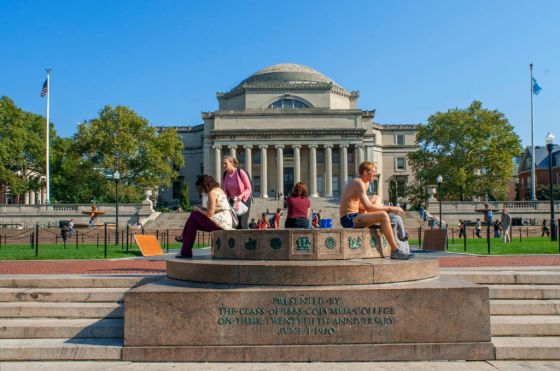Graciela Mochkofsky, dean of CUNY’s graduate school of journalism, has a proposal for the education of new journalists. Headline: “One Way to Help a Journalism Industry in Crisis: Make J-School Free.”
Writing in the New York Times, Mochkofsky implores: “Research shows that towns that have lost sources of local news tend to suffer from lower voter turnout, less civic engagement and more government corruption. Journalists are essential just as nurses and firefighters and doctors are essential.” And from that, she concludes: “And to continue to have journalists, we need to make their journalism education free.”
Nobody ever thinks he is part of the problem—even such obviously well-meaning people as the dean. There is an even simpler solution than making journalism school free: making journalism school history. That would be tough on the deans of journalism schools, but it would be the best thing for the business. Making journalism education “free” would have precisely one benefit: It would align the price of the product with its value.
I spent many years in the trenches of the local—and hyperlocal—journalism Mochkofsky is concerned about, from Lubbock, Texas, to the Philadelphia suburbs to rural Colorado. During all those years, I never once intentionally hired anybody with a journalism degree—and, if I did hire a j-school graduate, it was an oversight that I’m sure I should regret. Undergraduate journalism education is an entirely worthless endeavor, and journalism majors would be far better off studying almost anything else, from economics to French novels; graduate journalism education is a mostly worthless endeavor, and the real value of prestigious programs such as Columbia’s is in signaling and networking. As I said a few years ago in a speech hosted by the journalism school of a major university: The news business, the people who work in it, and the people currently studying journalism in college would be better off, on the whole, if we closed down the journalism schools tomorrow. There are very few areas of life about which I am a burn-it-down guy, but, when it comes to journalism schools, I’ve got the matches and the gasoline ready to go.
Let me add some nuance to the arson.
Partly, the issue at hand here is the fundamental organizational problem of higher education in the United States: our national unwillingness, inability, or refusal to distinguish between higher education and job training. Partly the problem is in the social peculiarities of the media business, in which the content-producing side is dominated by would-be social-reformers and do-gooders who don’t understand the business side (and who often hold it in contempt) while the business side is dominated by ad salesmen and accountants who don’t know what a newspaper is for (and often hold it in contempt). Journalism schools make the situation worse on both sides of the issue by acting as incubators of groupthink and conformism and as a quasi-credentialing apparatus, which diminishes the overall quality of reporting and commentary in our news pages by chasing innovative people out of the business, and, in doing so, exacerbates the economic challenges. Journalism schools are the primary party responsible for transplanting the insipid culture—and lax work ethic—of the American college campus to the newsroom.
Students in law school spend time studying the work of James Madison, who never sat a day in law school in his life (his alma mater, Princeton, to this day somehow gets by without a law school) but who spent a great deal of time studying Latin, history, and literature, and somehow managed to produce the Constitution without the blessing of his local bar association. For most of the history of newspapers, journalists were some combination of entrepreneur, printer, reporter, essayist, and agitator, and there was no such thing as a journalistic credential—the work either passed the test of the reading public or it didn’t. Subjecting future reporters to the careful attention of the dean of journalism, the dean of students, the career counselor, etc., was supposed to elevate the standards of the profession.
Credentialism did not elevate journalism—it neutered it.
Consider the case of the Dallas Morning News, which is typical of the struggling big-city daily broadsheet. With more than 600 employees (according to its most recently published annual report) and $150 million a year in revenue, it is a big operation. Do you know how many news stories its news staff produced on Tuesday, when I wrote this? Ten, by my count. (I’m counting everything but sports and opinion.) My college newspaper routinely put out a bigger daily report than that. Much of what the Dallas paper produces is boring boosterism, and almost all of it is touched by the kind of bland, unreflective progressive sensibility that flourishes in the journalism schools. I subscribe to the Morning News (along with several other newspapers) and I almost never read anything in it that makes me say: Holy heck, I didn’t know that! And most of what I see in the Dallas paper that is of any interest I can read in the other papers I subscribe to: the New York Times, the Wall Street Journal, the Washington Post, etc. I’ll leave unremarked-on the fact that a Dallas Morning News digital subscription costs more than a basic New York Times digital subscription except to note that that’s a heck of a price for a cold boiled chicken of a newspaper.
But, back to school.
A four-year liberal-arts education is a wonderful thing in and of itself. And the less “practical” such an education is, the better, in my view. College students should be studying Latin and reading Lord Jim and learning about sociolinguistics and astronomy even if—especially if—they don’t plan scholarly careers in those areas. Yes, some subjects can’t help but be a little bit useful—but even the math-and-science types should be getting educations that are mainly educational, not vocational. That’s what universities are for. Giving young people a first-class liberal education is an expensive undertaking whose relationship to economic gains is tangential and very difficult to show. That’s one of the reasons we shouldn’t try to give too many young people that kind of an education. The other reason is that most young people don’t have what it takes to benefit much from such an education and/or don’t want one. What the majority of them need and want is something different: job training.
There are jobs that require a great deal of education, including graduate education. Doctors, lawyers, certain kinds of scientists and engineers, and, of course, academics are examples of such occupations. The job of a reporter is not among these. If you want to teach an 18-year-old how to be a reporter covering the city council in San Bernardino (and I’ve reported on that ghastly organization), then you don’t need to charge him any tuition at all. In fact, you can reverse the direction of cash flow entirely and give him a paycheck—hire the kid to work as a reporter for six months or a year. If he likes the work and has some ability, then he’ll be able to learn on the job as an apprentice and should be reasonably capable in no more than a year. If he isn’t any good at it or doesn’t like the work—and it isn’t for everybody—then you’ll know pretty quickly, and you can do him and yourself the favor of not wasting everybody’s time and money by pretending that this kind of work requires four years of educational preparation—and, possibly, a master’s degree, to boot. The basic work of reporting isn’t easy, but it isn’t complicated.
As reporters continue into their careers, they often will specialize, and that is where some additional formal training can be very useful. But what they need to study isn’t journalism. What they need is specialist preparation. For example, Loyola’s “Journalist Law School” program seems like the kind of thing that would be very, very valuable to a young reporter. A similar program that taught young reporters how to read corporate financial statements and the like would be useful. And that raises another reason we should get rid of journalism-degree programs entirely: Undergraduates majoring in journalism aren’t majoring in economics, biology, history, Arabic, engineering, literature—or anything else that makes them more useful and productive as journalists.
Yes, practicality has a way of sneaking in. But that reinforces the point; The least important thing for a journalist to study is journalism.
If we are to continue having programs at universities, I think we should raise the tuition as much as we can—it would discourage future journalists from wasting their time and taking in too much pabulum.
Read more at The Dispatch
The Dispatch is a new digital media company providing engaged citizens with fact-based reporting and commentary, informed by conservative principles. Sign up for free.

